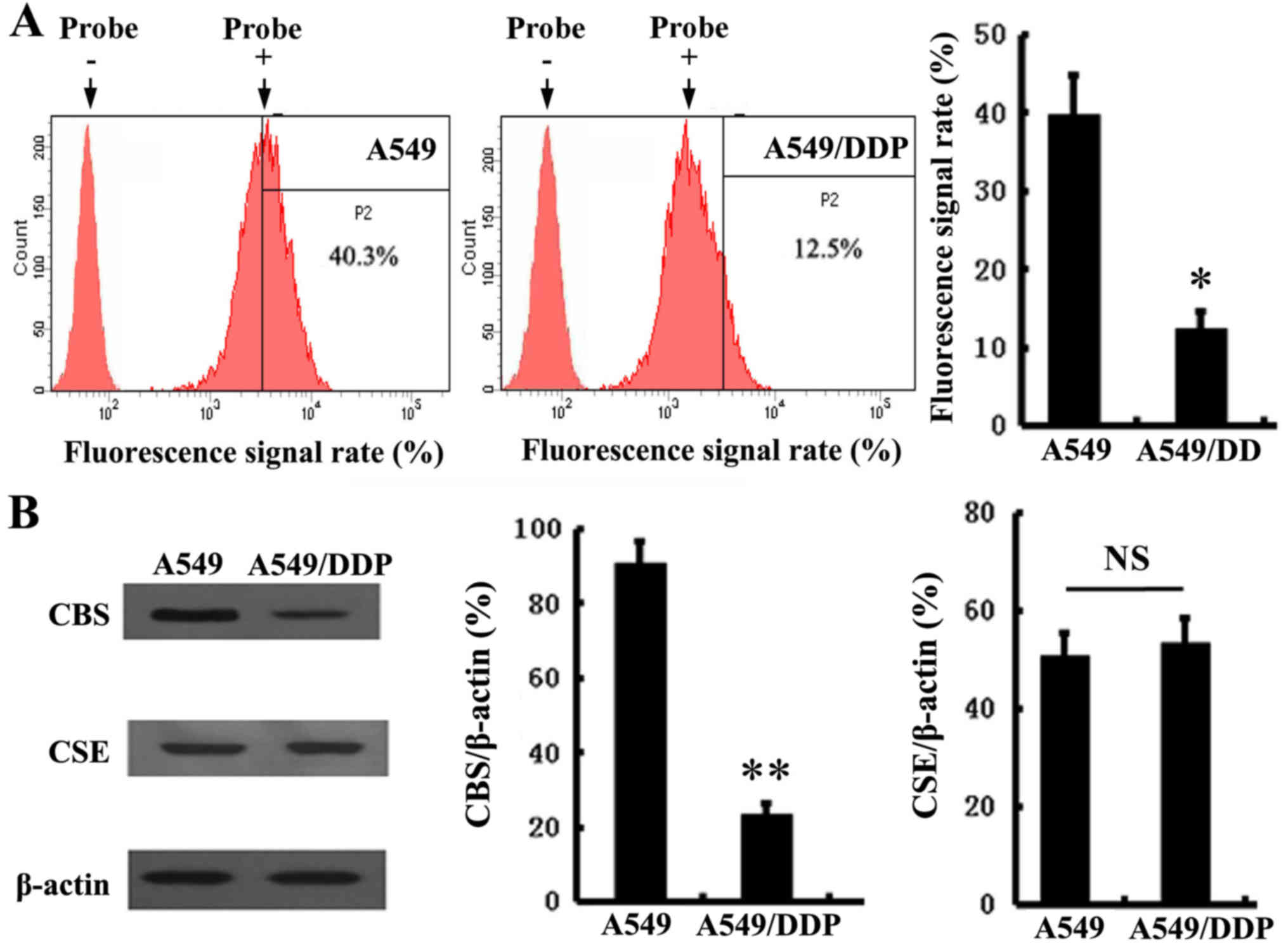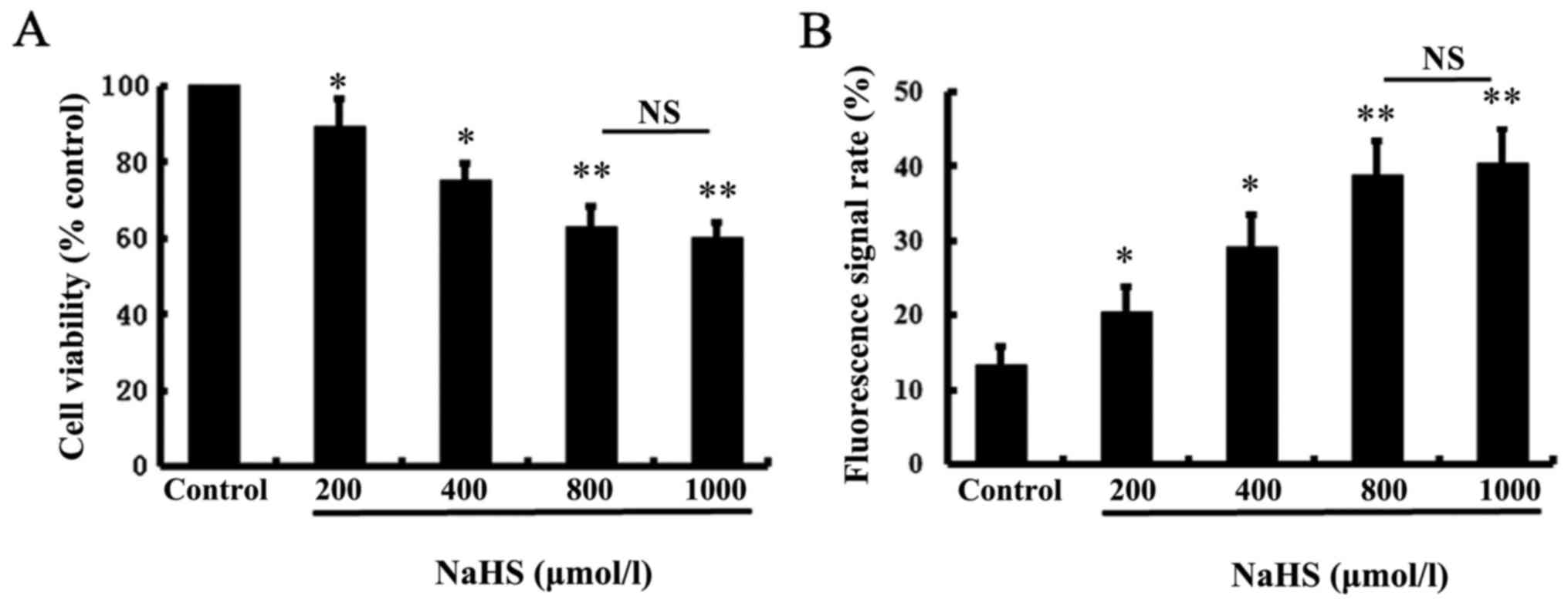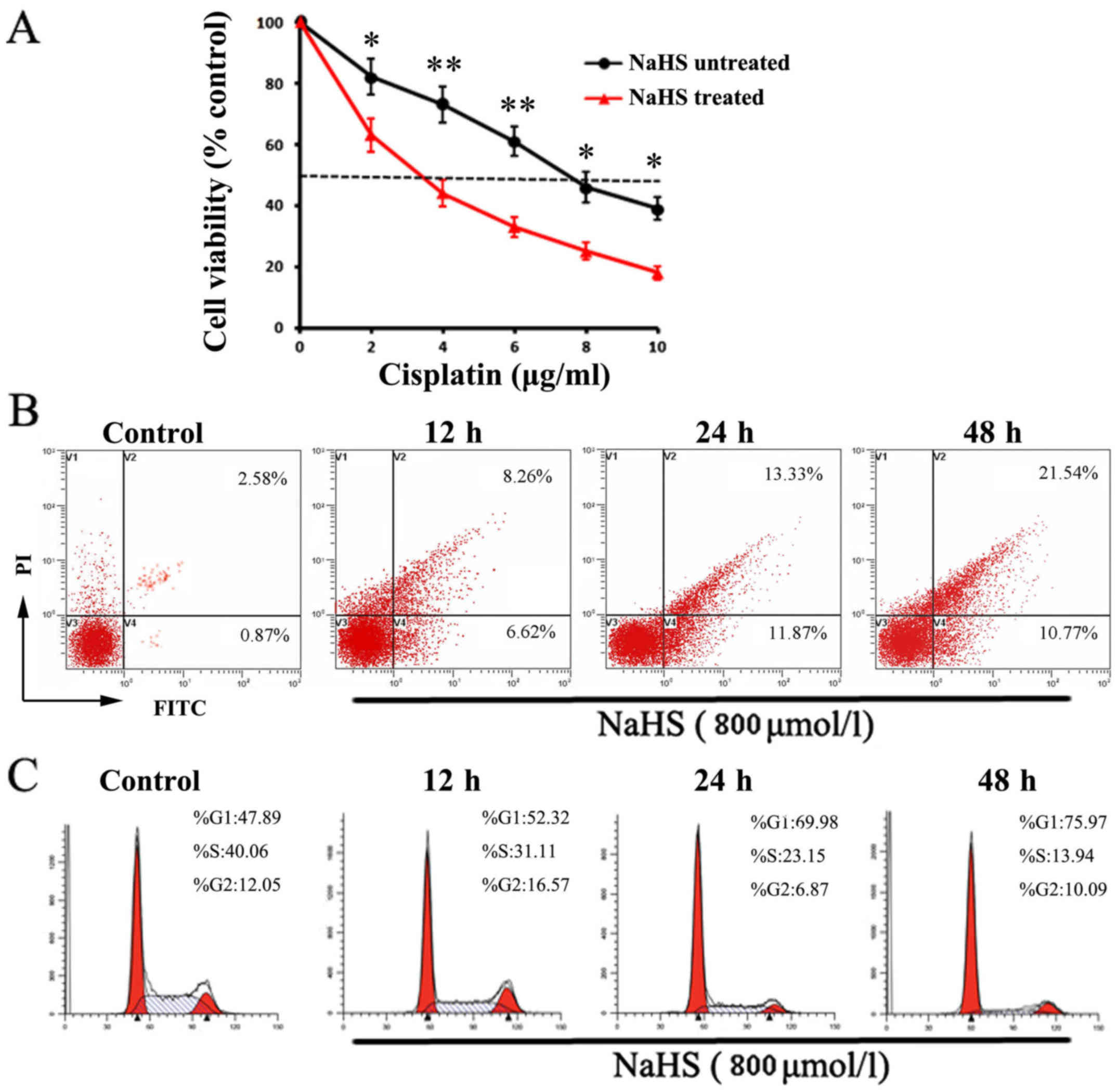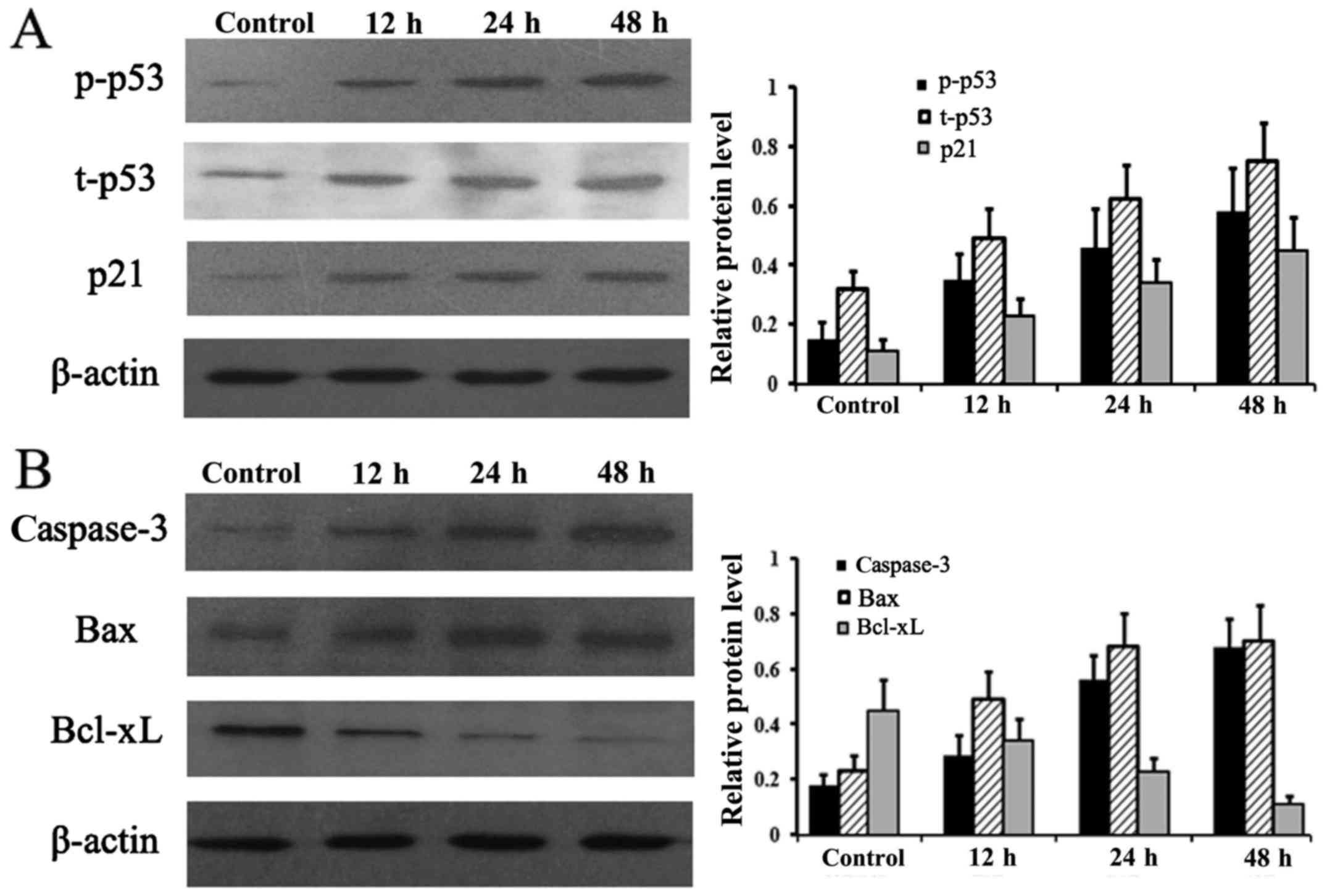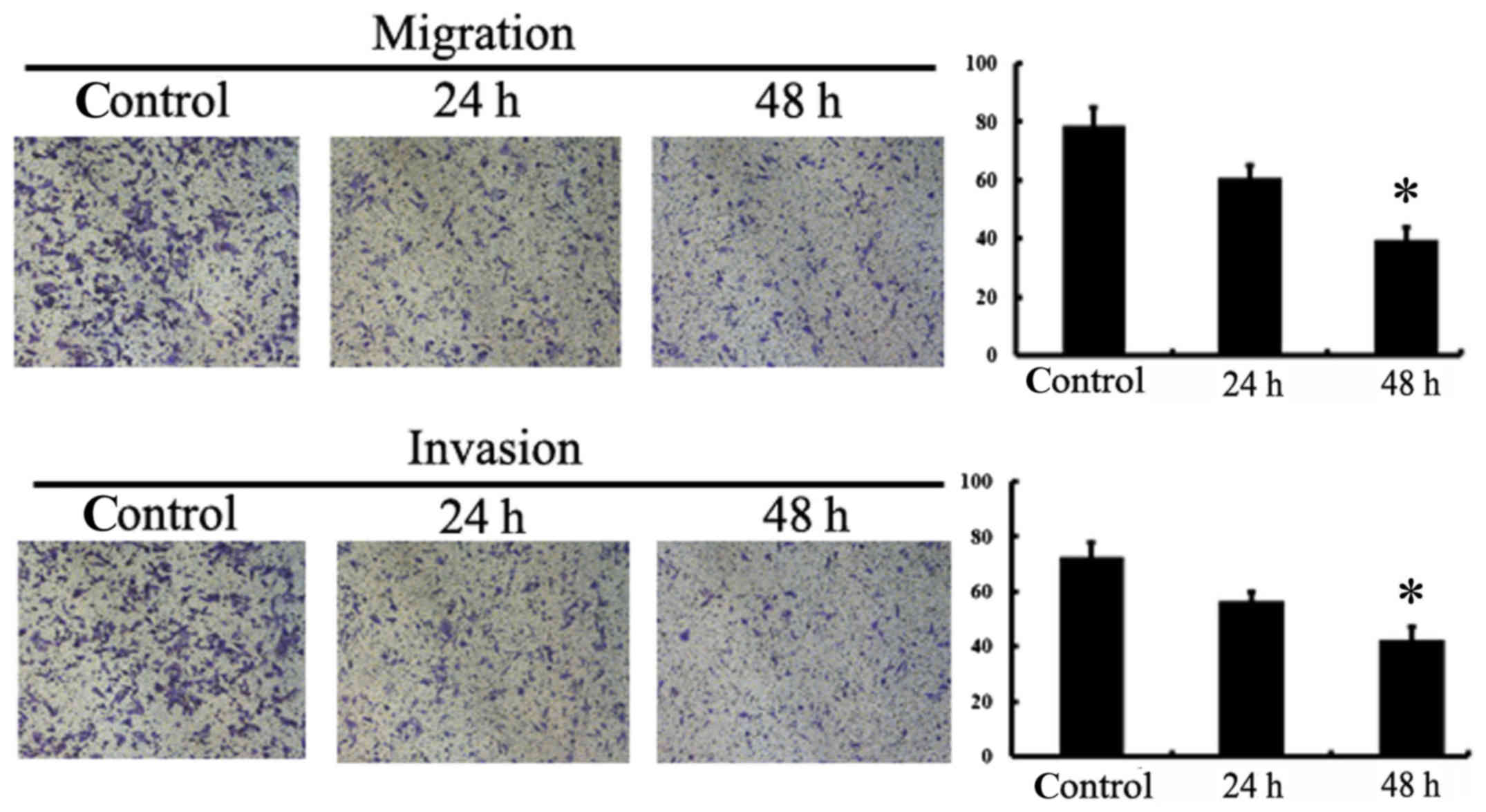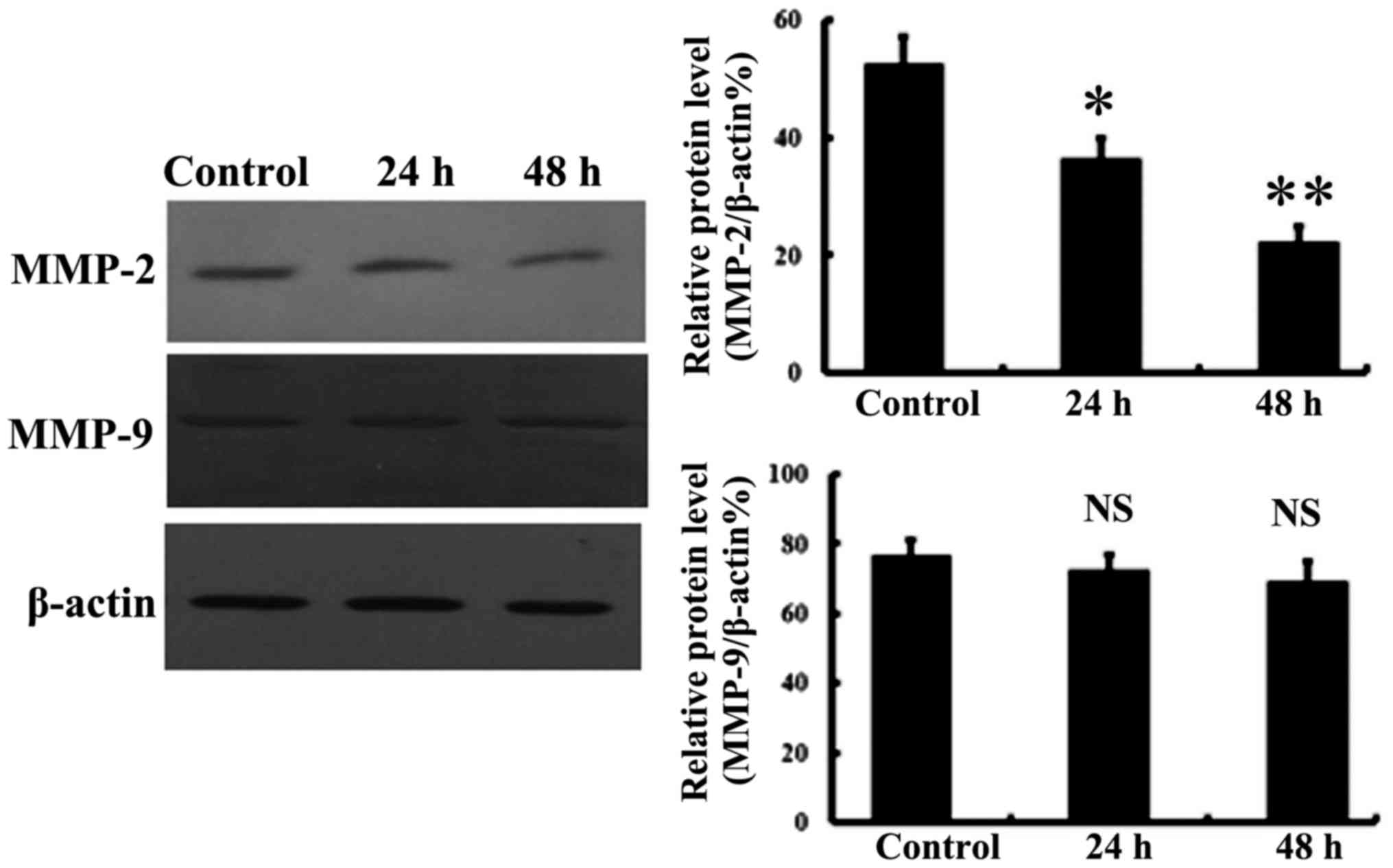|
1
|
Ma LY, Xie XW, Ma L, Pang JL, Xiong XM,
Zheng HD, Shen XL, Wen ZG and Wang HY: Downregulated long
non-coding RNA TRPM2-AS inhibits cisplatin resistance of non-small
cell lung cancer cells via activation of p53-p66shc pathway. Eur
Rev Med Pharmacol Sci. 21:2626–2634. 2017.PubMed/NCBI
|
|
2
|
Gao J, Meng Q, Zhao Y, Chen X and Cai L:
EHD1 confers resistance to cisplatin in non-small cell lung cancer
by regulating intracellular cisplatin concentrations. BMC Cancer.
16:4702016. View Article : Google Scholar : PubMed/NCBI
|
|
3
|
Fennell DA, Summers Y, Cadranel J, Benepal
T, Christoph DC, Lal R, Das M, Maxwell F, Visseren-Grul C and Ferry
D: Cisplatin in the modern era: The backbone of first-line
chemotherapy for non-small cell lung cancer. Cancer Treat Rev.
44:42–50. 2016. View Article : Google Scholar : PubMed/NCBI
|
|
4
|
Sarin N, Engel F, Kalayda GV, Mannewitz M,
Cinatl J Jr, Rothweiler F, Michaelis M, Saafan H, Ritter CA, Jaehde
U and Frötschl R: Cisplatin resistance in non-small cell lung
cancer cells is associated with an abrogation of cisplatin-induced
G2/M cell cycle arrest. PLoS One. 12:e01810812017. View Article : Google Scholar : PubMed/NCBI
|
|
5
|
Rose MC, Kostyanovskaya E and Huang RS:
Pharmacogenomics of cisplatin sensitivity in non-small cell lung
cancer. Genomics Proteomics Bioinformatics. 12:198–209. 2014.
View Article : Google Scholar : PubMed/NCBI
|
|
6
|
Hellmich MR, Coletta C, Chao C and Szabo
C: The therapeutic potential of cystathionine β-synthetase/hydrogen
sulfide inhibition in cancer. Antioxid Redox Signal. 22:424–448.
2015. View Article : Google Scholar : PubMed/NCBI
|
|
7
|
Wu D, Si W, Wang M, Lv S, Ji A and Li Y:
Hydrogen sulfide in cancer: Friend or foe? Nitric Oxide. 50:38–45.
2015. View Article : Google Scholar : PubMed/NCBI
|
|
8
|
Wallace JL and Wang R: Hydrogen
sulfide-based therapeutics: Exploiting a unique but ubiquitous
gasotransmitter. Nat Rev Drug Discov. 14:329–345. 2015. View Article : Google Scholar : PubMed/NCBI
|
|
9
|
Rose P, Moore PK and Zhu YZ: H2S
biosynthesis and catabolism: New insights from molecular studies.
Cell Mol Life Sci. 74:1391–1412. 2017. View Article : Google Scholar : PubMed/NCBI
|
|
10
|
Szabo C: Gasotransmitters in cancer: From
pathophysiology to experimental therapy. Nat Rev Drug Discov.
15:185–203. 2016. View Article : Google Scholar : PubMed/NCBI
|
|
11
|
Zhao Y, Biggs TD and Xian M: Hydrogen
sulfide (H2S) releasing agents: Chemistry and biological
applications. Chem Commun. 50:11788–11805. 2014. View Article : Google Scholar
|
|
12
|
Guo FF, Yu TC, Hong J and Fang JY:
Emerging roles of hydrogen sulfide in inflammatory and neoplastic
colonic diseases. Front Physiol. 7:1562016. View Article : Google Scholar : PubMed/NCBI
|
|
13
|
Lee ZW, Teo XY, Tay EY, Tan CH, Hagen T,
Moore PK and Deng LW: Utilizing hydrogen sulfide as a novel
anti-cancer agent by targeting cancer glycolysis and pH imbalance.
Br J Pharmacol. 171:4322–4336. 2014. View Article : Google Scholar : PubMed/NCBI
|
|
14
|
Szabo C, Coletta C, Chao C, Módis K,
Szczesny B, Papapetropoulos A and Hellmich MR: Tumor-derived
hydrogen sulfide, produced by cystathionine-β-synthase, stimulates
bioenergetics, cell proliferation, and angiogenesis in colon
cancer. Proc Natl Acad Sci USA. 110:12474–12479. 2013. View Article : Google Scholar : PubMed/NCBI
|
|
15
|
Bhattacharyya S, Saha S, Giri K, Lanza IR,
Nair KS, Jennings NB, Rodriguez-Aguayo C, Lopez-Berestein G, Basal
E, Weaver AL, et al: Cystathionine beta-synthase (CBS) contributes
to advanced ovarian cancer progression and drug resistance. PLoS
One. 8:e791672013. View Article : Google Scholar : PubMed/NCBI
|
|
16
|
Szczesny B, Marcatti M, Zatarain JR,
Druzhyna N, Wiktorowicz JE, Nagy P, Hellmich MR and Szabo C:
Inhibition of hydrogen sulfide biosynthesis sensitizes lung
adenocarcinoma to chemotherapeutic drugs by inhibiting
mitochondrial DNA repair and suppressing cellular bioenergetics.
Sci Rep. 6:361252016. View Article : Google Scholar : PubMed/NCBI
|
|
17
|
Russo A, Saide A, Cagliani R, Cantile M,
Botti G and Russo G: RpL3 promotes the apoptosis of p53 mutated
lung cancer cells by down-regulating CBS and NF-κB upon 5-FU
treatment. Sci Rep. 6:383692016. View Article : Google Scholar : PubMed/NCBI
|
|
18
|
Wang R, Yu FB, Chen LX, Chen H, Wang LJ
and Zhang WW: A highly selective turn-on near-infrared fluorescent
probe for hydrogen sulfide detection and imaging in living cells.
Chem Commun. 48:11757–11759. 2012. View Article : Google Scholar
|
|
19
|
Zhao L, Wang Y, Yan Q, Lv W, Zhang Y and
He S: Exogenous hydrogen sulfide exhibits anti-cancer effects
though p38 MAPK signaling pathway in C6 glioma cells. Biol Chem.
396:1247–1253. 2015. View Article : Google Scholar : PubMed/NCBI
|
|
20
|
Lee ZW, Zhou J, Chen CS, Zhao Y, Tan CH,
Li L, Moore PK and Deng LW: The slow-releasing hydrogen sulfide
donor, GYY4137, exhibits novel anti-cancer effects in vitro and in
vivo. PLoS One. 6:e210772011. View Article : Google Scholar : PubMed/NCBI
|
|
21
|
Chen Y, Gao Y, Zhang K, Li C, Pan Y, Chen
J, Wang R and Chen L: MicroRNAs as regulators of cisplatin
resistance in lung cancer. Cell Physiol Biochem. 37:1869–1880.
2015. View Article : Google Scholar : PubMed/NCBI
|
|
22
|
Galluzzi L, Vitale I, Michels J, Brenner
C, Szabadkai G, Harel-Bellan A, Castedo M and Kroemer G: Systems
biology of cisplatin resistance: Past, present and future. Cell
Death Dis. 5:e12572014. View Article : Google Scholar : PubMed/NCBI
|
|
23
|
Chattopadhyay M, Kodela R, Nath N,
Dastagirzada YM, Velázquez-Martínez CA, Boring D and Kashfi K:
Hydrogen sulfide-releasing NSAIDs inhibit the growth of human
cancer cells: A general property and evidence of a tissue
type-independent effect. Biochem Pharmacol. 83:715–722. 2012.
View Article : Google Scholar : PubMed/NCBI
|
|
24
|
Wu YC, Wang XJ, Yu L, Chan FK, Cheng AS,
Yu J, Sung JJ, Wu WK and Cho CH: Hydrogen sulfide lowers
proliferation and induces protective autophagy in colon epithelial
cells. PLoS One. 7:e375722012. View Article : Google Scholar : PubMed/NCBI
|
|
25
|
Lv M, Li Y, Ji MH, Zhuang M and Tang JH:
Inhibition of invasion and epithelial-mesenchymal transition of
human breast cancer cells by hydrogen sulfide through decreased
phospho-p38 expression. Mol Med Rep. 10:341–346. 2014. View Article : Google Scholar : PubMed/NCBI
|
|
26
|
De Preter G, Deriemaeker C, Danhier P,
Brisson L, Pham Cao TT, Grégoire V, Jordan BF, Sonveaux P and
Gallez B: A fast hydrogen sulfide-releasing donor increases the
tumor response to radiotherapy. Mol Cancer Ther. 15:154–161. 2016.
View Article : Google Scholar : PubMed/NCBI
|
|
27
|
Liu M, Wu L, Montaut S and Yang G:
Hydrogen sulfide signaling axis as a target for prostate cancer
therapeutics. Prostate Cancer. 2016:81085492016. View Article : Google Scholar : PubMed/NCBI
|
|
28
|
Wu D, Li M, Tian W, Wang S, Cui L, Li H,
Wang H, Ji A and Li Y: Hydrogen sulfide acts as a double-edged
sword in human hepatocellular carcinoma cells through
EGFR/ERK/MMP-2 and PTEN/AKT signaling pathways. Sci Rep.
7:51342017. View Article : Google Scholar : PubMed/NCBI
|
|
29
|
Hientz K, Mohr A, Bhakta-Guha D and
Efferth T: The role of p53 in cancer drug resistance and targeted
chemotherapy. Oncotarget. 8:8921–8946. 2017. View Article : Google Scholar : PubMed/NCBI
|
|
30
|
Pflaum J, Schlosser S and Müller M: p53
family and cellular stress responses in cancer. Front Oncol.
4:2852014. View Article : Google Scholar : PubMed/NCBI
|
|
31
|
Lane D and Levine A: p53 research: The
past thirty years and the next thirty years. Cold Spring Harb
Perspect Bio. 2:a0008932010.
|
|
32
|
Davaadelger B, Duan L, Perez RE, Gitelis S
and Maki CG: Crosstalk between the IGF-1R/AKT/mTORC1 pathway and
the tumor suppressors p53 and p27 determines cisplatin sensitivity
and limits the effectiveness of an IGF-1R pathway inhibitor.
Oncotarget. 7:27511–27526. 2016. View Article : Google Scholar : PubMed/NCBI
|
|
33
|
Leung EL, Fraser M, Fiscus RR and Tsang
BK: Cisplatin alters nitric oxide synthase levels in human ovarian
cancer cells: Involvement in p53 regulation and cisplatin
resistance. Br J Cancer. 98:1803–1809. 2008. View Article : Google Scholar : PubMed/NCBI
|
|
34
|
Häcker S, Karl S, Mader I, Cristofanon S,
Schweitzer T, Krauss J, Rutkowski S, Debatin KM and Fulda S:
Histone deacetylase inhibitors prime medulloblastoma cells for
chemotherapy-induced apoptosis by enhancing p53-dependent Bax
activation. Oncogene. 30:2275–2281. 2011. View Article : Google Scholar : PubMed/NCBI
|
|
35
|
Gregorc V, Ludovini V, Pistola L, Darwish
S, Floriani I, Bellezza G, Sidoni A, Cavaliere A, Scheibel M, De
Angelis V, et al: Relevance of p53, bcl-2 and Rb expression on
resistance to cisplatin-based chemotherapy in advanced non-small
cell lung cancer. Lung Cancer. 39:41–48. 2003. View Article : Google Scholar : PubMed/NCBI
|
|
36
|
Zhang L, Qi Q, Yang J, Sun D, Li C, Xue Y,
Jiang Q, Tian Y, Xu C and Wang R: An anticancer role of hydrogen
sulfide in human gastric cancer cells. Oxid Med Cell Longev.
2015:6364102015. View Article : Google Scholar : PubMed/NCBI
|
|
37
|
Guo W, Cheng ZY and Zhu YZ: Hydrogen
sulfide and translational medicine. Acta Pharmacol Sin.
34:1284–1291. 2013. View Article : Google Scholar : PubMed/NCBI
|















